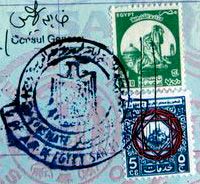One of the most maddening aspects of moving abroad is figuring out what to bring and how to fit it all into the two suitcases I am allowed on my flight over. I have never traveled to the Middle East before, and I don't know whether I will be able to acquire the little things that I find essential there or not. Should I bring lots of shoes? I've heard that Egyptian shoes are very easy to come by and very good, and alternately, that they are difficult to find and poorly made. Will I need a flashlight? Should I bring a pair of scissors, a sewing kit? The one thing that everyone agrees on: sunscreen is prohibitively expensive and difficult to come by. I guess this is one item that only the tourists use.
With less than a week left until take-off, I have purchased most of the things that seem important: rechargeable batteries, power adapters and converters, two good pairs of sandals, and a new digital camera. Because of the cultural modesty standards, I also bought a few long linen skirts and modest tops, but I figure I will do most of my clothes shopping there. That way I have more room in my luggage for shoes, textbooks, and sunscreen. Lots of sunscreen.
Today marked my last "official" hurdle in preparation for my fellowship. I have already submitted my application, passed a written exam, underwent a physical, withstood a phone interview, and got a negative on the HIV test that is required for a stay of longer than 60 days in the country, but I got my first taste of Egypt today by going to the Egyptian consulate in San Francisco to apply for a travel visa. After a 20-minute BART ride and a 30-minute bus ride up the hills into Pacific Heights, I stepped out of a quintessentially San Franciscan scene into one that was essentially Egyptian.
I had imagined the consulate to be a large administrative office, like the Department of Motor Vehicles, but this was essentially a house, where an Egyptian flag hanging above the front door and a plaque outside were the only identifying signs that this was an official building. After being buzzed in through a heavily barred and locked front door, I was ushered into a reception room full of Egyptians waiting in low, deep couches, where a man sat behind a desk with a portrait of President Hosni Mubarak behind him.
 My visa stamp for my passport. (Pamila Pengra photo) |
When the man gave me my change (a tourist visa to Egypt for an American citizen costs $15, and can either be purchased in advance at the consulate or bought when you arrive at the airport), I thanked him in hesitant Arabic with the word "shukran." Immediately the conversation in the room stopped. Delighted, the man began asking me if I spoke Arabic, when I had learned, and if I would be learning more on my trip to Egypt.
I instantly felt welcomed, as everyone complimented my Arabic and began giving me advice on learning the Egyptian dialect once I arrive. If the Egyptians in Egypt are as friendly as the ones in San Francisco, I have nothing to worry about.
—Pamila
Pamila Pengra graduated from UC Berkeley in May 2005 with a B.A. in linguistics. She is studying Arabic in Cairo on a CASA fellowship.




